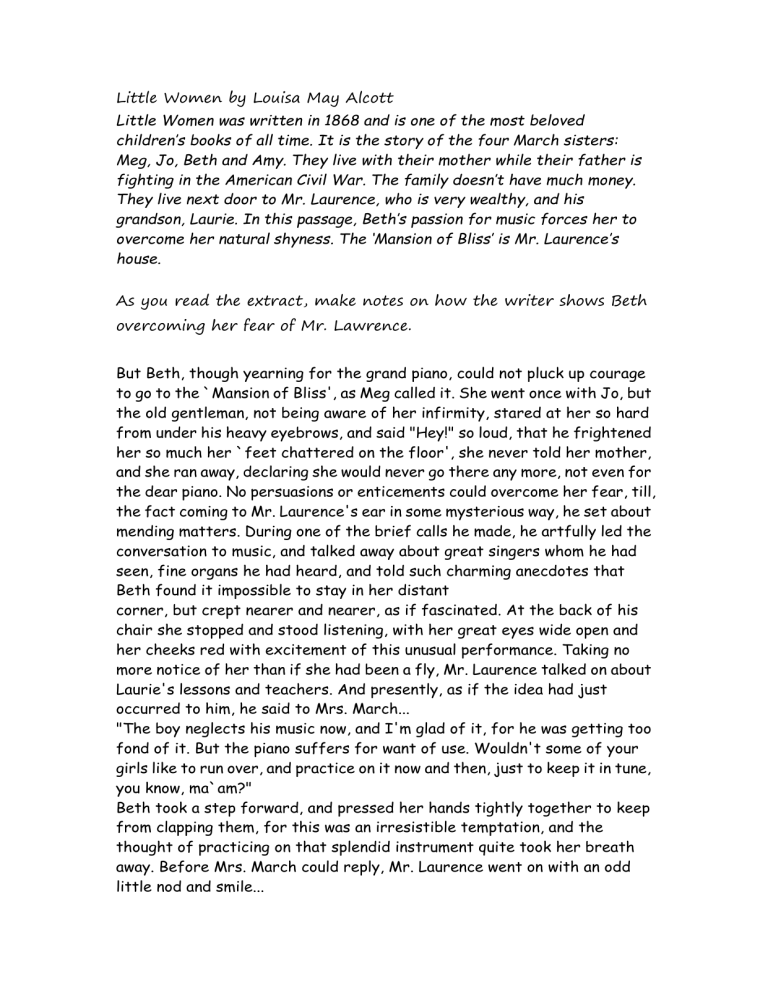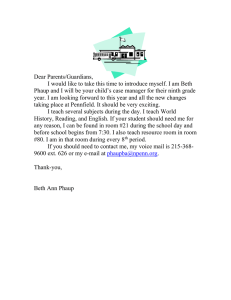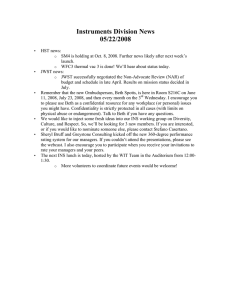
Little Women by Louisa May Alcott Little Women was written in 1868 and is one of the most beloved children’s books of all time. It is the story of the four March sisters: Meg, Jo, Beth and Amy. They live with their mother while their father is fighting in the American Civil War. The family doesn’t have much money. They live next door to Mr. Laurence, who is very wealthy, and his grandson, Laurie. In this passage, Beth’s passion for music forces her to overcome her natural shyness. The ‘Mansion of Bliss’ is Mr. Laurence’s house. As you read the extract, make notes on how the writer shows Beth overcoming her fear of Mr. Lawrence. But Beth, though yearning for the grand piano, could not pluck up courage to go to the `Mansion of Bliss', as Meg called it. She went once with Jo, but the old gentleman, not being aware of her infirmity, stared at her so hard from under his heavy eyebrows, and said "Hey!" so loud, that he frightened her so much her `feet chattered on the floor', she never told her mother, and she ran away, declaring she would never go there any more, not even for the dear piano. No persuasions or enticements could overcome her fear, till, the fact coming to Mr. Laurence's ear in some mysterious way, he set about mending matters. During one of the brief calls he made, he artfully led the conversation to music, and talked away about great singers whom he had seen, fine organs he had heard, and told such charming anecdotes that Beth found it impossible to stay in her distant corner, but crept nearer and nearer, as if fascinated. At the back of his chair she stopped and stood listening, with her great eyes wide open and her cheeks red with excitement of this unusual performance. Taking no more notice of her than if she had been a fly, Mr. Laurence talked on about Laurie's lessons and teachers. And presently, as if the idea had just occurred to him, he said to Mrs. March... "The boy neglects his music now, and I'm glad of it, for he was getting too fond of it. But the piano suffers for want of use. Wouldn't some of your girls like to run over, and practice on it now and then, just to keep it in tune, you know, ma`am?" Beth took a step forward, and pressed her hands tightly together to keep from clapping them, for this was an irresistible temptation, and the thought of practicing on that splendid instrument quite took her breath away. Before Mrs. March could reply, Mr. Laurence went on with an odd little nod and smile... "They needn't see or speak to anyone, but run in at any time. For I'm shut up in my study at the other end of the house, Laurie is out a great deal, and the servants are never near the drawing room after nine o'clock." Here he rose, as if going, and Beth made up her mind to speak, for that last arrangement left nothing to be desired. "Please, tell the young ladies what I say, and if they don't care to come, why, never mind." Here a little hand slipped into his, and Beth looked up at him with a face full of gratitude, as she said, in her earnest yet timid way... "Oh sir, they do care, very very much!" "Are you the musical girl?" he asked, without any startling "Hey!" as he looked down at her very kindly. "I'm Beth. I love it dearly, and I'll come, if you are quite sure nobody will hear me, and be disturbed," she added, fearing to be rude, and trembling at her own boldness as she spoke. "Not a soul, my dear. The house is empty half the day, so come and drum away as much as you like, and I shall be obliged to you." "How kind you are, sir!" Beth blushed like a rose under the friendly look he wore, but she was not frightened now, and gave the hand a grateful squeeze because she had no words to thank him for the precious gift he had given her. Little Women: Text-focused questions 1. Alcott writes ‘But Beth, though yearning for the grand piano, could not pluck up courage to go to’ Mr. Laurence’s house. What does the word ‘yearning’ mean here? Write a definition. 2. What two things does Mr. Laurence do that frighten Beth? 3. What does Mr. Laurence offer to the girls to go about ‘mending matters’? 4. Where will everybody else be whilst the girls are playing the piano? 5. Alcott writes that Mr. Laurence ‘stared at her so hard from under his heavy eyebrows, and said “Hey!” so loud, that he frightened her so much’. Why does she repeat the phrase ‘so much’ throughout this phrase? What does it suggest about Beth’s fear? 6. Beth is repeatedly shown to be frail and nervous. Find six pieces of evidence from across the text which suggests this. 7. As Mr. Laurence makes his offer, Beth ‘found it impossible to stay in her distant corner’. What other movements does Alcott describe which show Beth overcoming her fear of Mr. Laurence? Peter Pan by J M Barrie The novel Peter Pan began as a play in 1904, and was made into a novel in 1911. It is the story of three English children: Wendy, John and Michael Darling. They meet the amazing Peter Pan, a boy who lives in magical Neverland. In this passage, the reader is introduced to Nana, the Darling children’s nurse and nanny. As you read the extract, make notes about your first impressions of the Darling family. Mrs. Darling loved to have everything just so, and Mr. Darling had a passion for being exactly like his neighbours; so, of course, they had a nurse. As they were poor, owing to the amount of milk the children drank, this nurse was a prim Newfoundland dog, called Nana, who had belonged to no one in particular until the Darlings engaged her. She had always thought children important, however, and the Darlings had become acquainted with her in Kensington Gardens, where she spent most of her spare time peeping into perambulators, and was much hated by careless nursemaids, whom she followed to their homes and complained of to their mistresses. She proved to be quite a treasure of a nurse. How thorough she was at bath-time, and up at any moment of the night if one of her charges made the slightest cry. Of course her kennel was in the nursery. She had a genius for knowing when a cough is a thing to have no patience with and when it needs stocking around your throat. She believed to her last day in old-fashioned remedies like rhubarb leaf, and made sounds of contempt over all this new-fangled talk about germs, and so on. It was a lesson in propriety to see her escorting the children to school, walking sedately by their side when they were well behaved, and butting them back into line if they strayed. On John's footer [in England soccer was called football, "footer for short] days she never once forgot his sweater, and she usually carried an umbrella in her mouth in case of rain. There is a room in the basement of Miss Fulsom's school where the nurses wait. They sat on forms, while Nana lay on the floor, but that was the only difference. They affected to ignore her as of an inferior social status to themselves, and she despised their light talk. She resented visits to the nursery from Mrs. Darling's friends, but if they did come she first whipped off Michael's pinafore and put him into the one with blue braiding, and smoothed out Wendy and made a dash at John's hair. No nursery could possibly have been conducted more correctly, and Mr. Darling knew it, yet he sometimes wondered uneasily whether the neighbours talked. He had his position in the city to consider. Nana also troubled him in another way. He had sometimes a feeling that she did not admire him. "I know she admires you tremendously, George," Mrs. Darling would assure him, and then she would sign to the children to be especially nice to father. Lovely dances followed, in which the only other servant, Liza, was sometimes allowed to join. Such a midget she looked in her long skirt and maid's cap, though she had sworn, when engaged, that she would never see ten again. The gaiety of those romps! And gayest of all was Mrs. Darling, who would pirouette so wildly that all you could see of her was the kiss, and then if you had dashed at her you might have got it. There never was a simpler happier family until the coming of Peter Pan. Peter Pan: Text-focused questions 1. What is unusual about the Darlings’ nanny? 2. Nana is described as ‘prim’. What does this word mean? Write a definition. 3. Find three more references in the text which present Nana in a similar manner to ‘prim’. 4. Barrie writes that Nana ‘had belonged to no one in particular until the Darlings engaged her. She had always thought children important, however, and the Darlings had become acquainted with her in Kensington Gardens.’ How do the words ‘engaged’ and ‘acquainted’ help to make Nana seem a more appropriate nanny? 5. Mr. Darling is repeatedly shown to be insecure and anxious over his social position. Find five pieces of evidence from the text which suggest this. 6. Barrie writes ‘There is a room in the basement of Miss Fulsom’s school where the nurses wait.’ What tense is this written in, and how is this different from the rest of the extract? How does this help to make the story seem more realistic? 7. What does the final sentence imply about the effect of Peter Pan’s arrival upon the Darling family?



